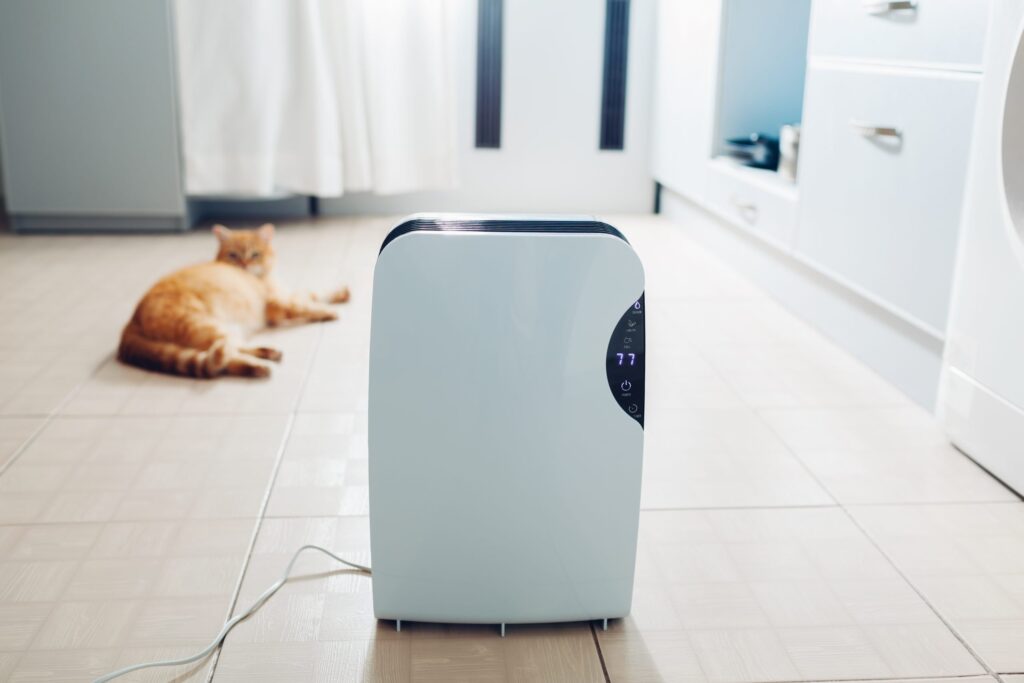The humidity level in your home can highly influence your health, often much more than we usually realize. Research published by the Environmental Health Perspective Journal also explains how a level of moisture outside of the ideal bracket of 35 – 50% can cause adverse effects on our physical and mental well-being. Indeed, it can worsen the effects of allergies and even trigger respiratory tract infections.
To extreme levels, inappropriate humidity in the building you spend most of your time can even cause Sick building syndrome (SBS) and asthma attacks.
It is not particularly challenging to regulate the humidity level and air quality in your home, basement, and crawl spaces. We all tend to forget about checking something this important. That’s where devices such as dehumidifiers and humidifiers can come in handy! Let’s look at how they can help you and the best device for your home.
Dehumidifier vs. Humidifier: Regulating the Humidity Levels in Your Home
Before heading out to buy a dehumidifier or humidifier, it is important to have a clearer idea of the humidity level and air quality in your home. In most homes, the ideal humidity level is 50% in summer and 25% to 40% in winter. There are simple ways to check this, and they won’t require you any significant investment.
- Method 1 – Purchase a hygrometer
The easiest way to check the humidity level in your home is to invest in a hygrometer (also known as an indoor humidity monitor). These can be bought from the nearest drugstore. All you will need to do is turn it on, place it in the room you wish to analyze, and follow the manufacturer’s instructions.
- Method 2 – Check for telltale signs.
The other simple method for this check does not require you to purchase a specific device, but to just have an attentive eye. Moisture in the windowsill, mold or odors coming from your basement or crawl spaces can indicate that the humidity level in your home is too high. Oppositely, if you get electrocuted every time you touch a doorknob, or you need to refill your plant’s vases with water every day, the humidity is too low.
Find out the best solution for your situation below.
What Is a Dehumidifier?
Dehumidifiers are devices that can help you regulate the level of humidity in your home, basement, or encapsulated crawl spaces by decreasing the level of moisture in the air. They work best when they are coupled with better ventilation, especially in areas where water tends to accumulate.
How Do Dehumidifiers Work?
Simply put, dehumidifiers absorb moisture out of the air, which can help you combat mildew, mold, dust mites, and all the ensuing health problems (e.g., asthma).
Depending on the type of dehumidifier you have picked, it will work through refrigeration or absorption. However, there are also desiccant, ionic, and electronic dehumidifiers on the market. The most common ones are:
- Refrigerative – it works through a fan that helps cool down the air. Moist air is drawn towards the coil, which will attract condensation and moisture before releasing the air into the room again.
- Desiccant or Absorbent – this type of dehumidifier draws air in, absorbing the moisture out of it through heat. The collected moisture is then trapped in an absorbent material, causing the device to release air with a lower level of humidity into the room.
- Ionic Membrane – while not as popular as the two seen above, this humidifier requires little maintenance, and it is highly efficient. It works through the process of electrolysis, which removes water vapor.
- Electronic – electronic humidifiers work through a heat pump that will create water vapor through condensation. Once the vapor is removed, the level of humidity in the air is also lower.
When to Use a Dehumidifier
A dehumidifier is best used to lower the level of humidity in a room. You are more likely to need it over the summer months – especially August and September – when humidity levels are highest.
It is recommendable to introduce a dehumidifier in your home if you have noticed telltale signs that the levels of humidity in your home are too high. These include mold and mildew or the worsening of respiratory conditions such as asthma. Make sure to check for signs in your basement and crawl spaces too.
What Is a Humidifier?
A humidifier is also a device designed to regulate the level of moisture in a home. It acts oppositely compared to a dehumidifier. It is designed to add moisture into indoor air. You are most likely to need it during the dryer winter and spring months.
How Do Humidifiers Work?
At the basic level, humidifiers add moisture to the air. They can do so in two different ways: cool mist or warm mist. This depends on the type of device you have invested in.
- Cool mist humidifiers – these are devices that create a cool mist that is released into the air.
- Warm mist humidifiers – these devices heat up water to the boiling point. The warm vapors, steam, and moisture are then released into your room, increasing humidity levels in the air.
When using a humidifier, it is crucial to keep them clean. Indeed, due to the high moisture levels that accumulate inside these devices, it is easy for mold and mildew to grow and increase. Ideally, you should clean your humidifier after each use.
When to Use a Humidifier
Generally, a humidifier needs to be used during the winter months when humidity levels are at their minimum. If you have not invested in a hydroscope, you should look for the telltale signs that can help you identify a low-humidity problem in your home.
Some of the health issues associated with low humidity levels include headaches, nosebleeds, dry skin, and the worsening of allergies. In terms of the damages that low moisture can cause in your house, you will likely notice signs such as dry woodwork and cracked furniture.
Is a Dehumidifier the Same as a Humidifier?
While they are both regulating the humidity levels of indoor air, humidifiers and dehumidifiers work in the completely opposite way. The first one is useful in situations when the moisture level in the air is too high. The second will help you bring the moisture levels down to a safer level.
Which One Is Better?
Both devices are extremely effective, especially if you have a limited natural ventilation system in your home or basement. However, the one to pick purely depends on your home’s needs.
When picking a dehumidifier, you should opt for a refrigerative or absorbent device. However, Ionic membrane ones are also extremely efficient, and they only require little maintenance. Electronic dehumidifiers are extremely silent (so they are perfect for your bedroom) but not as efficient as the other models.
Instead, when picking a humidifier, you will only need to pick whether you would like it to release a warm or cool mist. This is usually related to the winter temperatures in your area!


